Where is the Congestion Charge Zone?
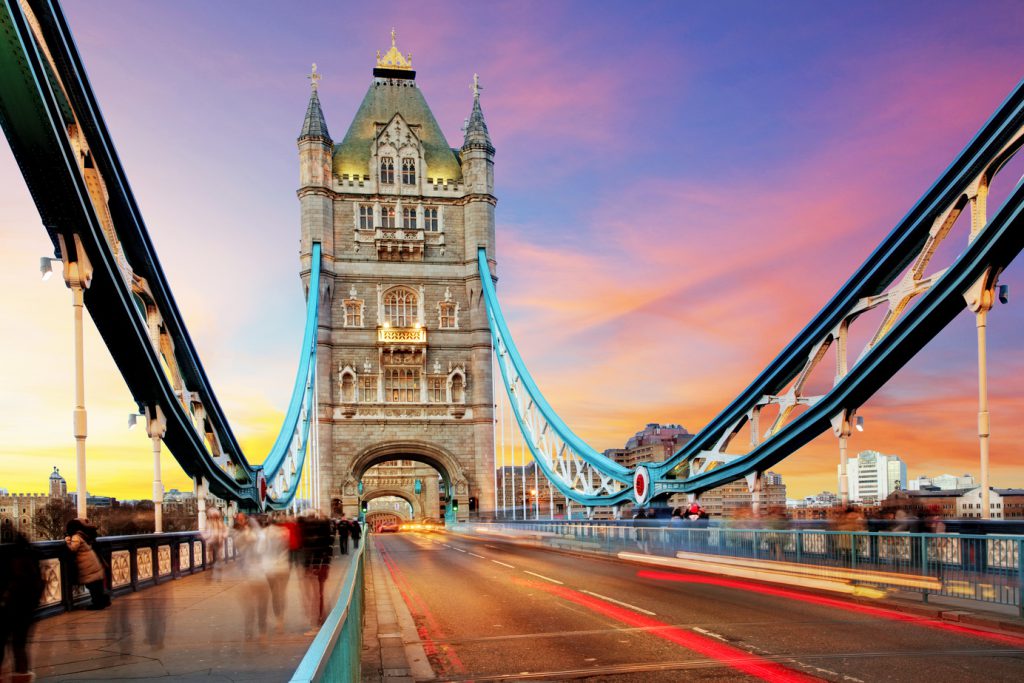
The Congestion Charge Zone (CCZ) is an area in central London where there’s a fee for driving during certain times of the day.
The idea behind the CCZ is to make drivers reconsider using their cars, reducing the number of vehicles (and therefore air pollution) in the capital’s city centre.
But where is the Congestion Charge Zone in London? How do you know if you enter it? And is your car exempt from paying? Let’s find out.
Where is the Congestion Charge Zone in London?
The Congestion Charge Zone is managed by Transport for London (TfL) and covers 21 square kilometres (8 square miles) of central London.
You can visualise the Congestion Zone on the TfL’s interactive map — or search for a specific postcode to see if it falls within the CCZ.
What areas are in the Congestion Charge Zone?
The Congestion Charge Zone covers the following areas:
BarbicanBloomsburyBoroughCharing CrossCity of LondonClerkenwellCovent GardenEustonFinsburyFitzroviaHolbornLondon BridgeMayfairSohoSt James’sSt PancrasWaterloo
It also covers parts of Marylebone, Lambeth, Southwark and Westminster.
Where does the Congestion Zone start?
The major roads defining the CCZ boundary include Pentonville Road, City Road, Old Street, Commercial Street, Mansell Street, Tower Bridge Road, New Kent Road, Elephant and Castle, Kennington Lane, Vauxhall Bridge Road, Park Lane, Edgware Road, Marylebone Road and Euston Road.
Is Paddington in the Congestion Zone?
No, Paddington sits just outside the London Congestion Zone.
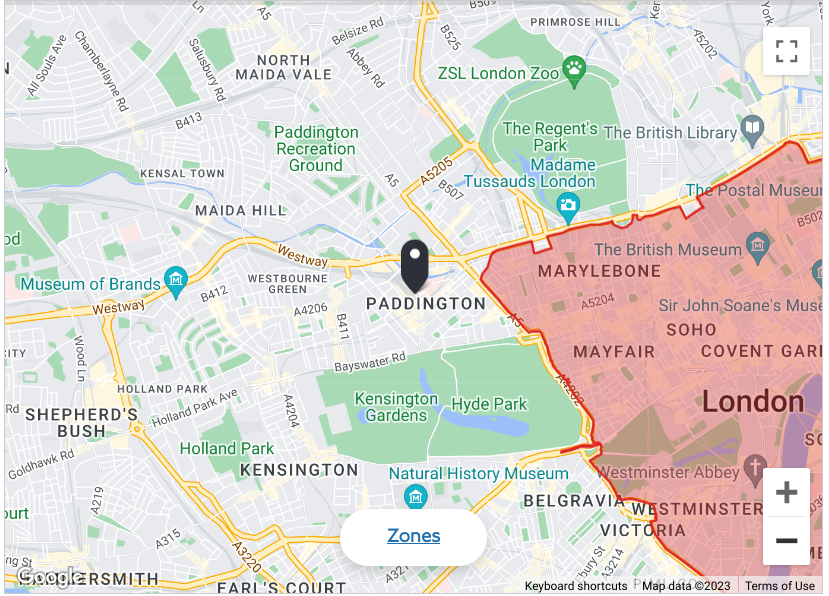
Is Earl’s Court in the Congestion Zone?
No, Earl’s Court is outside of the Congestion Charge Zone.
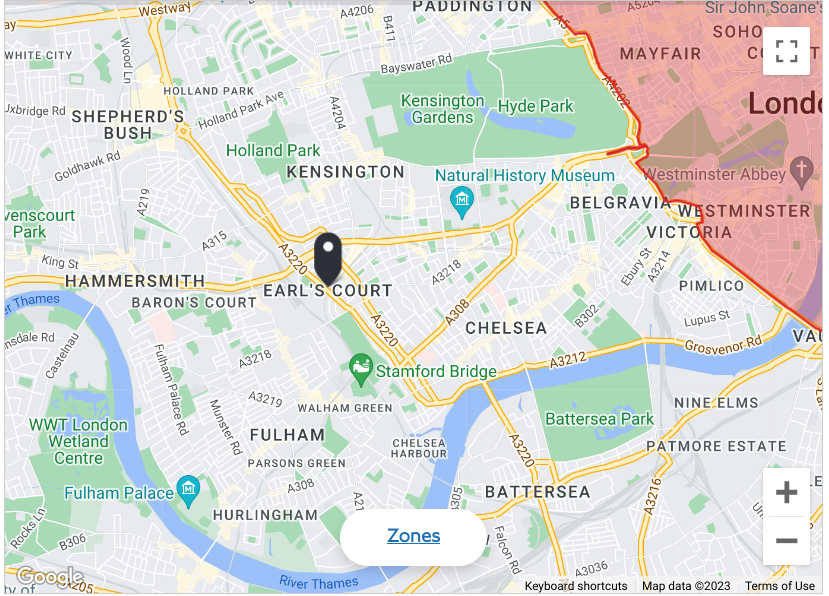
When does the Congestion Charge Zone apply?
The Congestion Charge in London applies between:
07:00 – 18:00 (7 am – 6 pm), Monday to Friday; and12:00 – 18:00 (12 pm – 6 pm) Saturday, Sunday, and bank holidays.
Do you have to pay the Congestion Charge on a Sunday?
Yes, the Congestion Charge still applies on a Sunday, but only between 12 pm and 6 pm.
When don’t you have to pay the Congestion Charge in London?
The Congestion Charge doesn’t apply between:
18:00 – 07:00 (6 pm – 7 am), Monday to Friday; and18:00 – 12:00 (6 pm – 12 pm) Saturday, Sunday, and bank holidays.
There’s also no charge between Christmas Day and New Year’s Day.
How do I know if I enter the Congestion Charge Zone?
The CCZ isn’t fenced off by physical barriers. Instead, the entry points to the congestion area in London are clearly marked by the following sign:
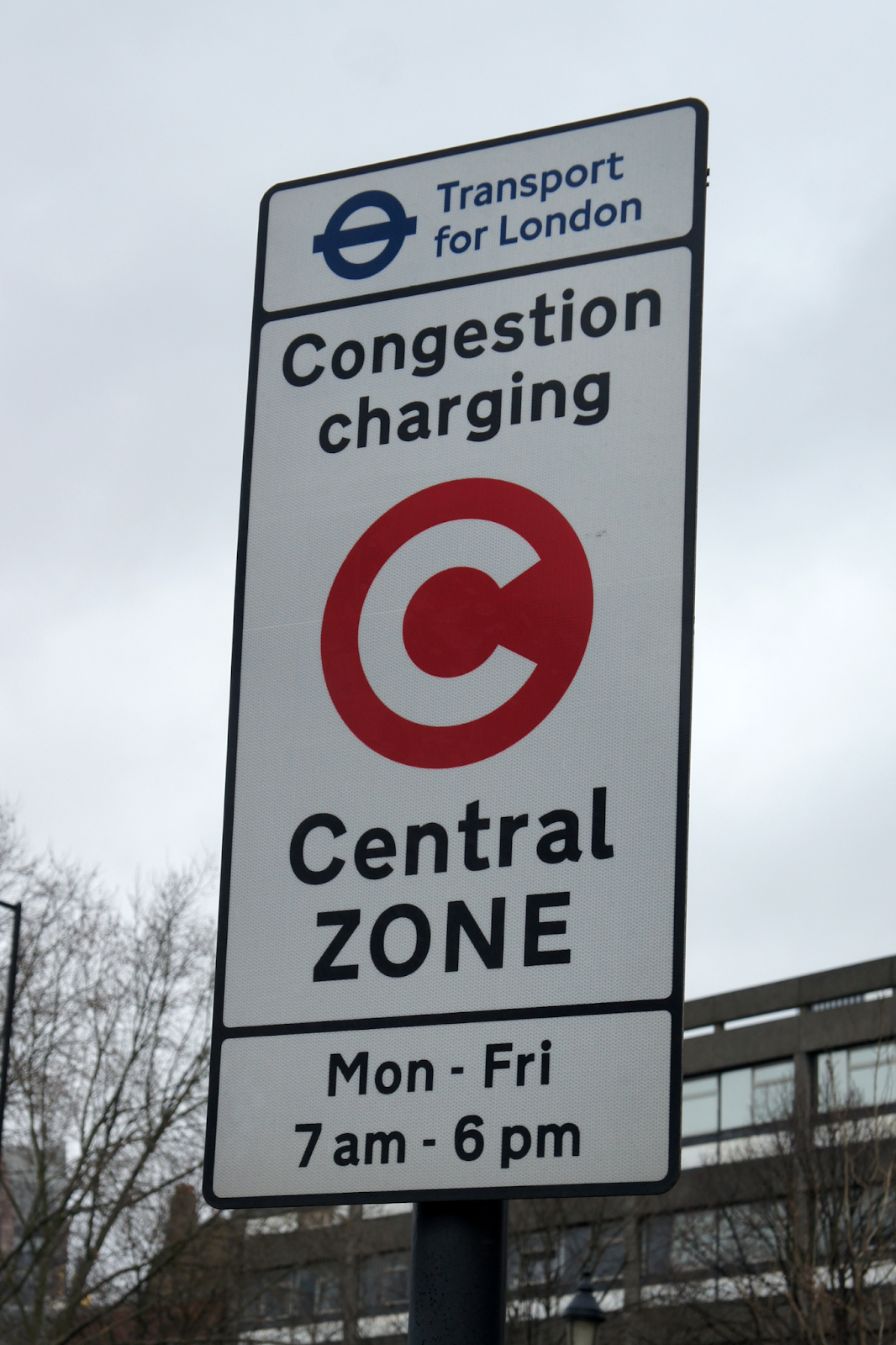
Image credit: Wikimedia Commons
Once you drive into the CCZ, your car’s registration plate will be read by an automatic number plate recognition (ANPR) camera. It’s then checked against a database to see if your vehicle has been registered, has paid the charge, or has applied for an exemption.
You’ll know you’ve left the CCZ when you see the following sign:
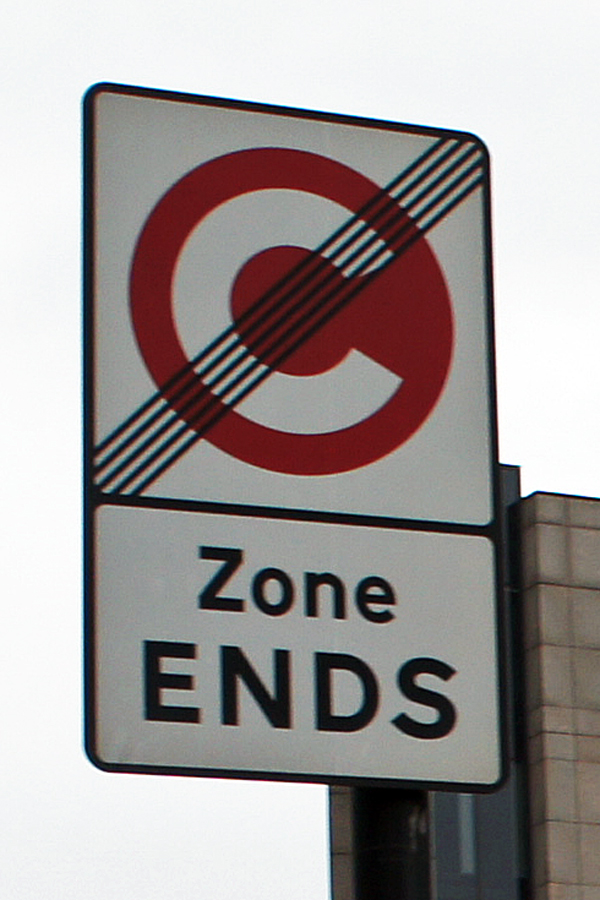
Image credit: Wikimedia Commons
How much is the Congestion Charge?
It costs £15 per day to drive in the CCZ if you pay in advance or on the same day of travel.
After this, it rises to £17.50, and you’ve got three days to pay it. If you fail to pay the Congestion Charge within three days of travel, you’ll be issued a penalty (more on that below).
How do you pay the Congestion Charge?
If you’re planning on driving in London’s CCZ, there are several ways to pay:
Auto Pay: Transport for London offers an Auto Pay option for frequent drivers, billing you automatically for the number of charging days your vehicle travels within the CCZ.
You must be at least 18 years old to use this option. To use Auto Pay, simply set up an account, link a payment card or complete a Direct Debit mandate, and tell TfL which vehicle you’d like to register.
And if you operate a business requiring employees to drive within the CCZ, you can set up Fleet Auto Pay. This allows six or more company vehicles to be charged automatically via Direct Debit.
Online: You can also make a one-off payment online for a single day or a group of days. You can pay up to 90 days in advance of your day(s) of travel, or three days after, up to midnight on the third day.
App: Alternatively, you can download the free TfL Pay to drive in London app (available from the Apple App Store and Google Play Store). With the app, you can make one-off payments, set up Auto Pay, check if a postcode is in the Charging Zone, see your payment history, and pay a penalty.
Note: The above methods are the only ways to pay for the Congestion Charge in London. Avoid paying through unofficial websites or apps — you could be at risk of fraud, and your vehicle won’t be registered, leading to a penalty down the line.
What are the penalties for not paying the Congestion Charge?
If you fail to pay the Congestion Charge by midnight of the third day following your travel within the CCZ, you’ll be sent a Penalty Charge Notice (PCN) for £160.
You’ve got 28 days to pay it or challenge it if you think your vehicle should have been exempt (more on exemptions next) or your vehicle was driven by someone else inside the CCZ without your consent.
If you pay the PCN within 14 days of the date it was issued, the fee is reduced to £80.But if you don’t pay or challenge the PCN within 28 days, the fee increases to £240.
Is my car exempt from the Congestion Charge?
The London Congestion Charge applies to almost all vehicles, with the exception of the following:
Emergency vehiclesBreakdown recovery vehiclesBattery electric or hydrogen fuel cell vehicles (note: this exemption ends on 25 December 2025)Two-wheeled motorbikes (and sidecars)MopedsVehicles with nine or more seatsBlue Badge holdersVehicles used by disabled people that are exempt from vehicle tax and have a ‘disabled’ taxation classVehicles for more than one disabled person (for example, Dial-a-Ride) that are exempt from vehicle tax and have a ‘disabled’ taxation class
How do I prove my vehicle is exempt?
Depending on the type of vehicle, you’ll need to send Transport for London the relevant information from your DVLA V5C logbook to prove you meet the exemption criteria.
You may also be asked for further supporting documentation, such as both sides of your Blue Badge for Blue Badge holders seeking exemption.
In most cases, you’ll need to pay £10 to register your vehicle for exemption.
Even if your vehicle clearly sits within one of the above categories, you can’t simply assume you’re exempt from the charge. You must register, otherwise, you’ll still have to pay when you enter the CCZ.
Are there any Congestion Charge discounts available for residents?
Yes. If you live inside London’s Congestion Charge Zone, you’re entitled to a 90% residents’ discount. You must be able to prove that the address is your main or permanent residence and used solely for residential purposes. There’s an annual £10 registration charge for this discount.
Are there any other Low Emission Zones in London?
Besides the CCZ in London, there is also an Ultra Low Emission Zone (ULEZ) and a Low Emission Zone (LEZ). You can see both on the TfL interactive map.
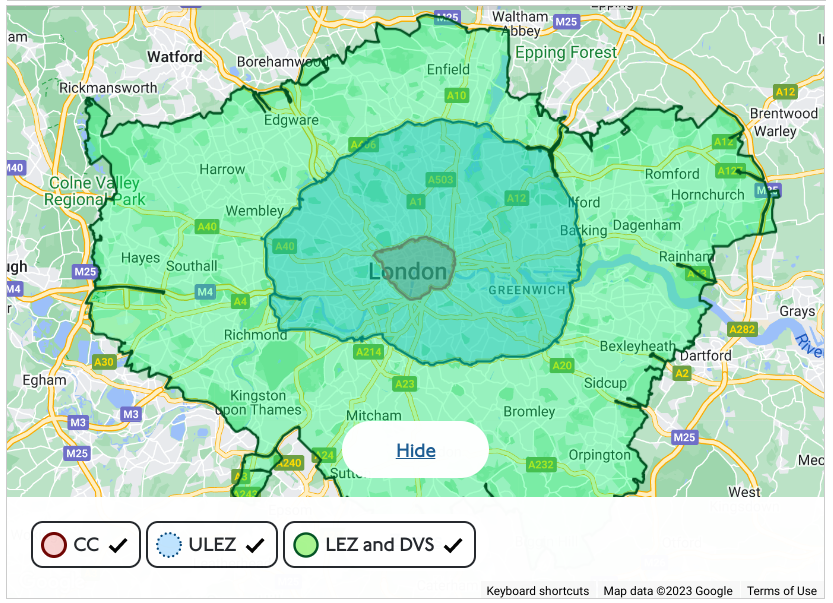
Similar to the CCZ, charges apply if your vehicle does not meet certain emissions standards and is not exempt. Both the LEZ and ULEZ operate 24 hours a day, every day (with the exception of Christmas Day for the ULEZ).
Note: The ULEZ is expanding from 29 August 2023 to include all London boroughs.
In summary
To recap, the Congestion Charge Zone covers most of central London and driving in it costs £15 per day, unless your vehicle is exempt. If you don’t pay in advance or on the day of travel, the fee increases to £17.50. And if you fail to pay the Congestion Charge by midnight of the third day following travel within the CCZ, you’ll be issued a penalty notice.
You can check whether your destination is inside the CCZ by using Transport for London’s interactive map and pay online here.
Also read:
New Driving Laws in The UK 2023-2024 (Full Guide)
10 Clean Air Zones to be aware of in 2022
Are electric vehicles expensive to insure?







